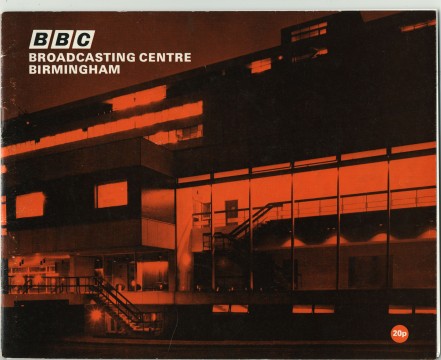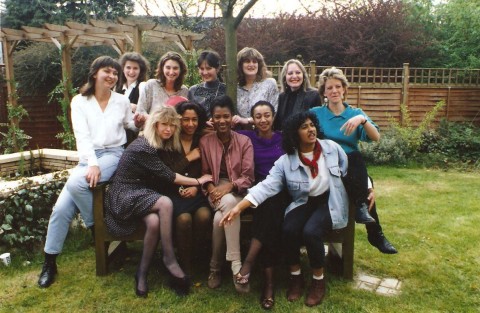This brochure was produced to celebrate the opening of BBC Pebble Mill in 1971. Thanks to Juliet Dean for keeping her copy safe all these years. The last image is a picture of the original Pebble Mill farm, which was on the site before the building was erected. Before the building of Pebble Mill, production in Birmingham was scattered between sites in Carpenter Road, Edgbaston with a television studio at Gosta Green. It was sold for the princely sum of 20p!
Category: Building
21st Anniversary of Pebble Mill
Juliet Dean of the Film Unit had kept this brochure and photos – thanks to her.
The 21st anniversary of Pebble Mill was held in 1992.
The first photo features (left to right) Jerry Johns (Press Office), David Waine (Head of Building), Lord Mayor of Birmingham and wife, Rod Natkiel (Head of Network Programmes).
The second photo features the Lord Mayor of Birmingham with a lady who’d baked a cake of the Pebble Mill building to commemorate the 21st anniversary.
A brochure was printed to celebrate the anniversary, the rest of the photos are of the brochure.
Film Unit – photos from Maggie Humphries & Juliet Dean
Photos from Maggie Humphries & Juliet Dean.
These photos include stills of the Film Unit Office, featuring Bill Bohanna (Manager Film), Maggie Humphries & Diane Welch, Juliet Dean.
Photos of the crews include:
– Cameraman Mike Willie, and assistant Keith Froggatt and others, by the pond
– Keith Froggatt on the camera crane
– Cameramen Nigel Davey and Keith Froggatt
– John Couzens doing a tracking shot from a wheelchair
– John Parker and Roger Waldron recording 3 Minute Heroes
– Cameraman Eric Wise (below the cross)
– John Couzens, Eric Wise, Andy Payne and Tim Green, filming by a road
The Film Unit was a busy office on the 1st floor at the back of Pebble Mill. All the allocation of film camera crews was done from the Office, as well as the ordering of specialist film equipment. The Film Unit also organised the film editors, allocating editors to programmes, including news, dramas and documentaries. Most filmed programmes were shot on 16mm film. Shooting and editing on film were replaced in the late 1980s and 1990s by single camera video recording on beta and then digibeta, and the editing equipment changed from steenbecks to Avid.
Afro-Caribbean Unit – photo Bev Dartnall
Photo by Bev Dartnall, no reproduction without permission.
Pebble Mill was the home of BBC multicultural programming for many years, including the Asian Programmes Unit, and the Afro Caribbean Unit. The Afro Caribbean Unit made programmes like the weekly magazine series: ‘Ebony’, which went out in the 1980s, presented by Vastiana Belfon amongst others.
Director, Sharon Pemberton adds the following information:
“The photo was actually taken whilst the ‘Multicultural Progs Unit was based in the famous ‘portacabin’. (Freezing in winter, boiling in summer!)
The gals in the photo are:
Back L-R) Victoria Trow (from editing) Annie Jenkins (from graphics) Sharon Pemberton, Sarah Costigan, Beverley Dartnall, Ann Holmes, Trudi Cresser
(Front L-R)Jo Mainwearing, Anna Umbima, Vastiana Belfon, Rosemary Boateng and Mary Gregory.
We made three major series for BBC2 during the 1990′s – ‘Black Britain’, ‘Black on Europe’ and ‘Africa – Out of Darkness’.
All ground-breaking stuff, although I don’t think I realised it at the time.”
Telecine – photos by John Kimberley & Ivor Williams
Photos by John Kimberley and Ivor Williams, no reproduction without permission.
These photos include the Rank Cintel 16 mm Flying Spot Telecine (1971) and the VTA Ampex 2000 & amp; Sepmag Machines (1971).
Telecine is the process by which film footage is transferred to video. It also refers to the equipment used in the transfers. Telecine is an amalgam of the words ‘television’ and ‘cinema’.




